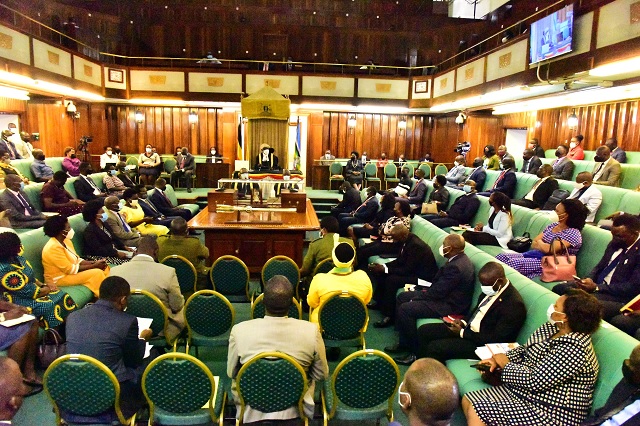
PARLIAMENT .
Parliament of Uganda Tuesday finally passed the UPDF (Amendment) Bill, 2025, amid stiff resistance from Opposition legislators.
The controversial Bill grants military courts sweeping powers to try civilians under certain circumstances, a move that directly contradicts a January 31 land mark ruling of the Supreme Court .
Clauses 29 and 30 of the Act give military tribunals jurisdiction over civilians found in possession of restricted weapons or accused of collaborating with soldiers in serious crimes such as treason, aggravated robbery, or murder.
Since its tabling Opposition ,MPs have condemned the legislation describing it as a grave constitutional breach.
Leader of the Opposition in Parliament Joel Ssenyonyi, who led a dramatic walkout from plenary, said despite the passing of the Bill , they are going to challenge it in the courts of law.
Nansana Municipality MP Mr Wakayima Musoke said “what the army is trying to do is create two parallel systems, which is unacceptable.”
“We were not given enough time to process all the ideas of the law and that is why we walked out,” Legislators Musoke, Geofrey Kayemba Ssolo, and Geoffrey Lutaaya added.
Kioga North MP Moses Okot Bitek told plenary that military courts “cannot be impartial and independent, thereby making them unconstitutional and offensive to the principles of fair hearing and natural justice.”
On Tuesday, citing Article 92 of the Constitution, which prohibits Parliament from enacting laws that overturn specific court decisions, Opposition MPs accused their counterparts in the ruling National Resistance Movement of defying the judiciary in a bid to entrench executive power.
“This is an attempt to legitimize illegitimacy,” Ssenyonyi charged.
A minority report by opposition MP Jonathan Odur warned: “There’s no justification for going against the Supreme Court.”
Still, the NRM used its numerical dominance to bulldoze the legislation through Parliament, amid unusually heavy security deployment.
State minister for sports under the Education docket , Mr Peter Ogwang delivered an emotional defence of the Bill, recounting his traumatic past and revealing that his mother was raped by Karimojong warriors, an experience he said “shaped his support for stronger military enforcement.”
Soi lawmaker Fadhil Chemaswet also acknowledged that “the military court martial plays an important role in maintaining discipline within the armed forces.”
Defence Minister Jacob Marksons Oboth-Oboth, who tabled the bill, argued it was a necessary step in protecting national security.
“This is not about persecuting ordinary Ugandans,” he said, adding that: “It is about those whose preoccupation is to endanger national security.”
In a parallel move, Parliament on Tuesday also passed the Political Parties and Organisations (Amendment) Bill, 2025, which restricts public funding to political parties registered under the National Consultative Forum (NCF).
The Bill , if assented to by the president, would halt public funding to political parties such as National Unity Platform (NUP) , which is not affiliated with either the NCF or the Inter-Party Organisation for Dialogue (IPOD).
Opposition UPC party president Jimmy Akena decried the Act saying: “I’ve not been consulted as a leader of the IPOD Summit. How is it that we are debating this issue? It is diabolical and has not been done in the interest of the players.”
On his part, Attorney General Kiryowa Kiwanuka defended the Political Parties and Organisations (Amendment) Bill, 2025, noting that “it seeks to reorganize the NCF.”